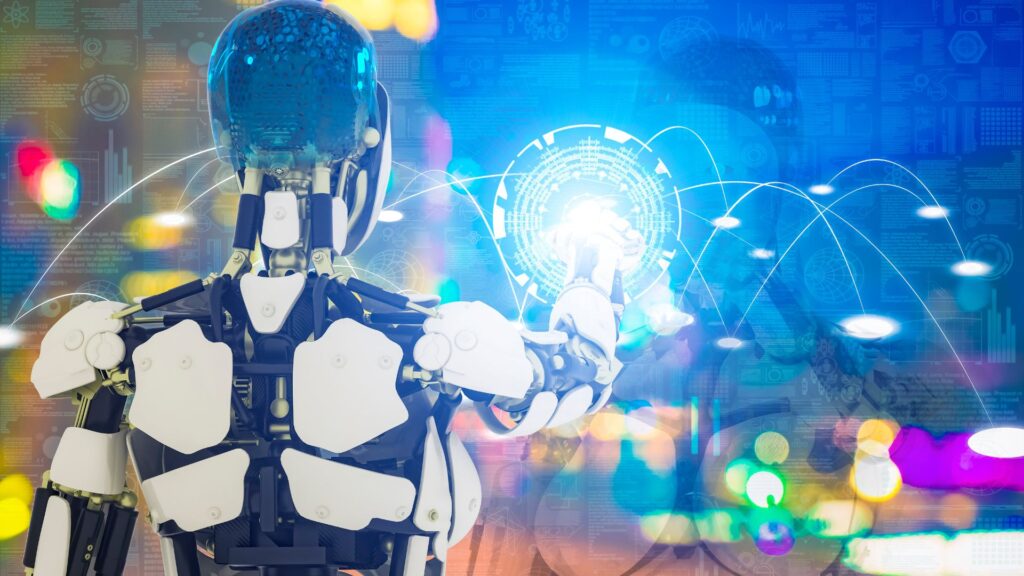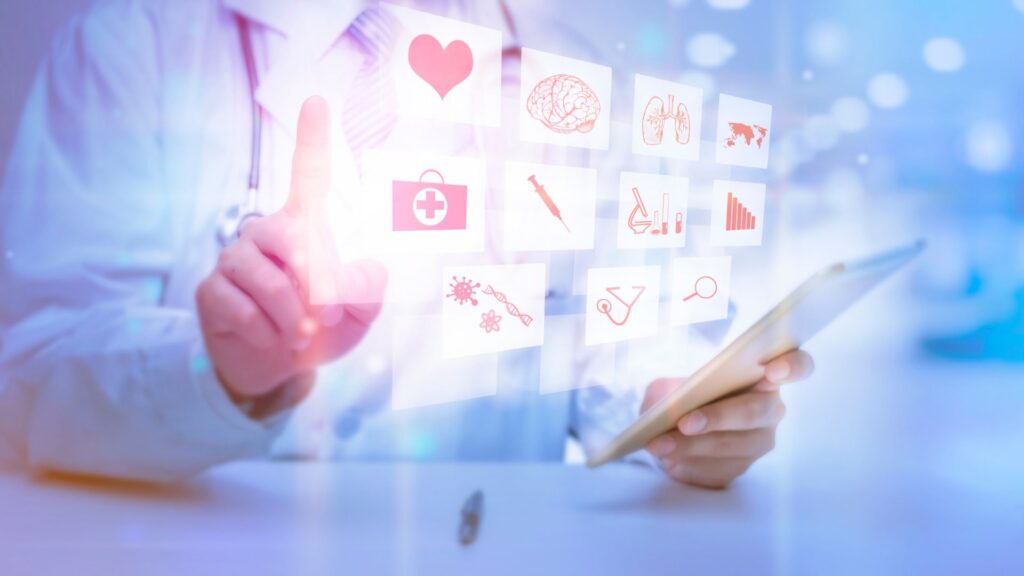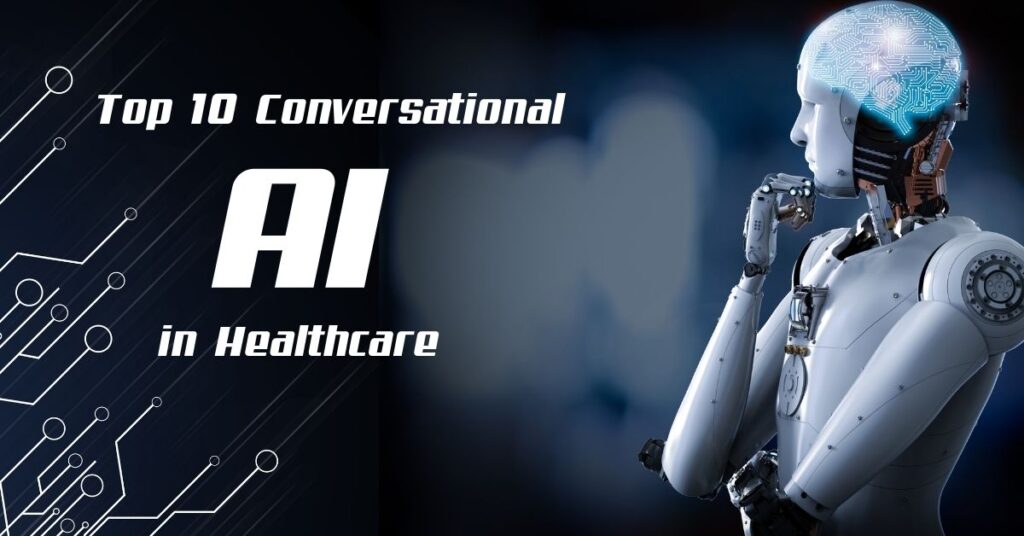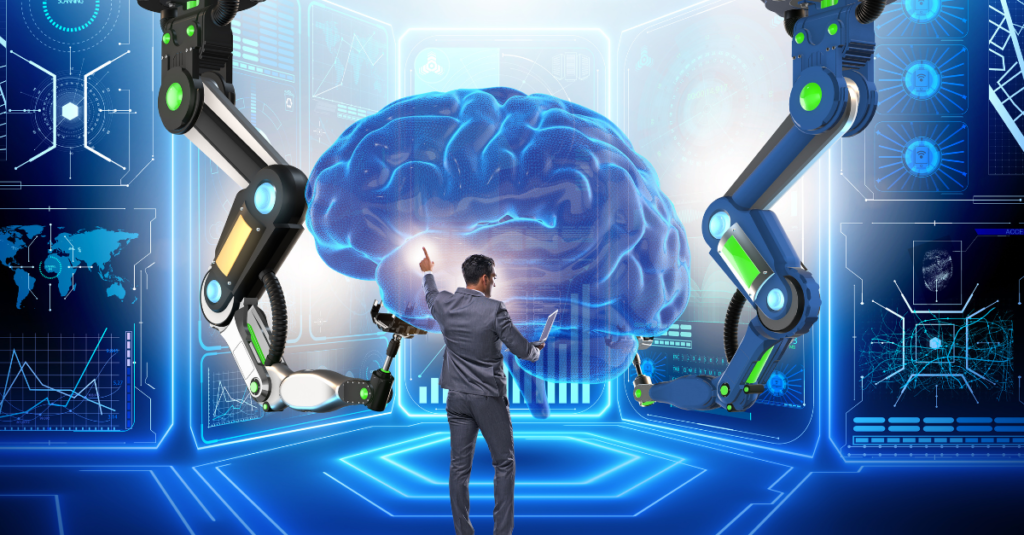Table of Contents
Technology has been transforming the healthcare industry for decades, enabling better diagnosis, treatment, and prevention of diseases. However, one of the most promising and innovative applications of technology in healthcare is the use of artificial intelligence (AI) chatbots. AI chatbots are software programs that can interact with humans through natural language, providing information, guidance, and support. In this article, we will explore the benefits, applications, and challenges of AI chatbots in healthcare, and how they can revolutionize patient engagement and support.
Understanding AI Chatbots in Healthcare

The Basics of AI Chatbot for Healthcare
AI chatbots are powered by two main technologies: natural language processing (NLP) and machine learning. NLP is the ability of a computer to understand and generate natural language, such as speech or text. Machine learning is the ability of a computer to learn from data and improve its performance without explicit programming. Together, these technologies enable chatbots to understand user queries, provide relevant responses, and learn from feedback.
Some of the popular healthcare chatbots include:
- Babylon Health: A chatbot that provides medical consultations based on user symptoms and health history.
- Ada: A chatbot that helps users assess their health conditions and find appropriate care.
- Florence: A chatbot that acts as a personal health assistant, reminding users to take their medication, tracking their health metrics, and providing health tips.
Why Healthcare Needs AI Chatbots
The current healthcare system faces many challenges and inefficiencies, such as:
- Lack of access: According to the World Health Organization (WHO), more than half of the world’s population lacks access to essential health services.
- High costs: The global health expenditure per capita was $1,064 in 2018, with significant disparities across regions and countries.
- Low quality: Medical errors are the third leading cause of death in the United States, accounting for more than 250,000 deaths per year.
An AI chatbot for Healthcare can address these challenges and improve health services by:
- Increasing access: AI chatbots can provide 24/7 health information and support to anyone with an internet connection, regardless of their location or income.
- Reducing costs: AI chatbots can lower the burden on healthcare providers by automating tasks such as appointment scheduling, symptom assessment, and patient education.
- Improving quality: AI chatbot for Healthcare can enhance patient outcomes by providing accurate and personalized health advice, reducing errors and delays, and facilitating follow-up care.
Several studies have shown the impact of AI chatbots in healthcare. For example:
- A study by Stanford University found that an AI chatbot for Healthcare could diagnose common childhood illnesses as accurately as pediatricians.
- A study by Babylon Health found that its chatbot could achieve a higher score than human doctors on a medical exam.
- A study by Ada Health found that its chatbot could reduce unnecessary emergency department visits by 40%.
Applications of AI Chatbots for Healthcare

Patient Engagement and Education
One of the main benefits of healthcare chatbots is to engage and educate patients about their health conditions. AI chatbot for Healthcare can provide patients with relevant and reliable information about their symptoms, diagnosis, treatment options, and prognosis. They can also answer common questions and address concerns that patients may have.
Moreover, AI chatbots can promote healthy lifestyles and disease prevention by providing tips on nutrition, exercise, stress management, and other wellness topics. They can also motivate patients to adhere to their treatment plans and monitor their progress.
Some examples of healthcare chatbots supporting patient engagement are:
- Woebot: An AI chatbot for Healthcare that provides cognitive behavioral therapy (CBT) for people with depression and anxiety.
- Wysa: A chatbot that offers emotional support and coaching for mental health issues.
- Lark: A chatbot that helps users manage chronic conditions such as diabetes and hypertension.
Appointment Scheduling and Reminders
Another application of an AI chatbot for healthcare is to streamline appointment scheduling processes. AI chatbots can enable patients to book, cancel, or reschedule appointments with ease. They can also provide information about the location, duration, and preparation for the appointment.
Furthermore, AI chatbots can reduce no-show rates by sending timely reminders to patients before their appointments. They can also follow up with patients after their appointments to collect feedback and provide additional resources.
Some examples of healthcare providers using chatbots for appointment management are:
- Sensely: A chatbot that connects patients with doctors via video calls.
- Zocdoc: AI chatbot for Healthcare that helps users find and book doctors online.
- HealthTap: A chatbot that allows users to consult doctors via text or voice.
Symptom Assessment and Triage
Another application of AI chatbots in healthcare is to assist patients in assessing their symptoms. AI chatbot for Healthcare can ask patients a series of questions to gather information about their health condition. They can then provide a preliminary diagnosis and suggest the best course of action.
Additionally, an AI chatbot for Healthcare can triage patients, directing them to appropriate care. They can determine the urgency and severity of the patient’s condition and recommend whether they should visit a doctor, go to the emergency room, or stay at home.
Some examples of healthcare organizations using chatbots for symptom assessment are:
- Mayo Clinic: A chatbot that provides self-care guidance and COVID-19 screening.
- Cleveland Clinic: A chatbot that offers symptom checker and virtual care.
- NHS: AI chatbot for Healthcare that provides bits of advice and directs users to local services.
Challenges and Concerns in Implementing AI Chatbots

Privacy and Security
One of the major challenges and concerns in implementing an AI chatbot for healthcare is privacy and security. Patient data is sensitive and confidential and must be protected from unauthorized access, use, or disclosure. However, medical AI chatbots may pose risks to patient data privacy and security, such as:
- Data breaches: Hackers may exploit vulnerabilities in the chatbot system or network to steal or leak patient data.
- Data misuse: Chatbot developers or third parties may use patient data for purposes other than providing health services, such as marketing or research.
- Data bias: Chatbot algorithms may produce inaccurate or discriminatory results based on incomplete or skewed data.
To address these risks, AI chatbot for healthcare must comply with regulations and standards relevant to patient data privacy and security, such as:
- HIPAA: The Health Insurance Portability and Accountability Act of 1996 (HIPAA) is a US law that sets rules for the protection of health information.
- GDPR: The General Data Protection Regulation (GDPR) is a European Union law that regulates the processing of personal data.
- ISO 27001: The International Organization for Standardization (ISO) 27001 is a standard that specifies the requirements for an information security management system.
Some best practices for ensuring the confidentiality of patient information are:
- Encryption: Encrypting data means converting it into a code that can only be deciphered by authorized parties.
- Authentication: Authenticating users means verifying their identity and granting them access to the chatbot system.
- Consent: Obtaining consent means asking users for their permission before collecting, using, or sharing their data.
Human-AI Collaboration
Another challenge and concern in implementing an AI chatbot for healthcare is human-AI collaboration. Human-AI collaboration refers to the interaction and cooperation between humans and AI systems. In healthcare, human-AI collaboration involves the role of healthcare professionals alongside AI chatbots.
AI chatbots are not meant to replace human doctors, nurses, or therapists. Rather, they are meant to augment and complement their work. AI chatbots can perform tasks that are repetitive, tedious, or time-consuming, such as data collection, analysis, or communication. This can free up time and resources for healthcare professionals to focus on tasks that require human skills, such as empathy, creativity, or judgment.
However, human-AI collaboration also poses some challenges and concerns, such as:
- Trust: Healthcare professionals and patients may have doubts about the reliability, accuracy, or safety of AI chatbots.
- Accountability: It may be unclear who is responsible for the outcomes or errors of AI chatbots.
- Ethics: There may be ethical dilemmas or conflicts arising from the use of AI chatbots in healthcare.
To overcome these challenges and concerns, human-AI collaboration in healthcare must follow some principles and guidelines, such as:
- Transparency: AI chatbots should explain their logic, reasoning, and limitations to users.
- Auditability: AI chatbots should record their actions, decisions, and outcomes for review and evaluation.
- Humanity: AI chatbots should respect human values, dignity, and autonomy.
The Future of AI Chatbots in Healthcare

Advancements in AI Technology
AI technology is constantly evolving and improving. New developments in AI technology could enhance the capabilities and performance of chatbots in healthcare. Some of the emerging AI technologies that could benefit chatbots are:
- Deep learning: Deep learning is a branch of machine learning that uses complex neural networks to learn from large amounts of data.
- Computer vision: Computer vision is the ability of a computer to process and understand visual information, such as images or videos.
- Speech recognition: Speech recognition is the ability of a computer to convert spoken words into text or commands.
These technologies could enable chatbots to:
- Understand more complex queries: Deep learning could help chatbots understand natural language better, including slang, idioms, or emotions.
- Interpret more diverse inputs: Computer vision and speech recognition could help chatbots process and understand visual and auditory information, such as photos, videos, or voice messages.
- Provide more personalized responses: Deep learning could help chatbots tailor their responses to the user’s preferences, personality, or mood.
Another AI technology that could have a significant impact on chatbots in healthcare is quantum computing. Quantum computing is a type of computing that uses quantum physics to perform operations that are impossible or impractical for classical computers. Quantum computing could potentially:
- Speed up data processing: Quantum computing could help chatbots process and analyze large amounts of health data faster and more efficiently.
- Enhance data security: Quantum computing could help chatbots encrypt and decrypt data more securely and reliably.
- Solve complex problems: Quantum computing could help chatbots solve complex health problems that require optimization, simulation, or modeling.
Patient-Centric Healthcare
AI chatbots could pave the way for a patient-centric healthcare system. A patient-centric healthcare system is one that puts the patient at the center of the care delivery process, ensuring that their needs, preferences, and values are respected and met. AI chatbots could enable patient-centric healthcare by:
- Empowering patients: AI chatbots could empower patients to take charge of their own health, by providing them with information, education, and support.
- Engaging patients: AI chatbots could engage patients in their care journey, by providing them with feedback, motivation, and encouragement.
- Personalizing care: AI chatbots could personalize care for each patient, by providing them with customized treatment plans and recommendations.
AI chatbots could transform the healthcare industry by revolutionizing patient engagement and support. They could provide patients with convenient, accessible, and affordable health services. They could also improve patient outcomes by providing accurate, timely, and relevant health advice. However, AI chatbots also pose some challenges and concerns in terms of privacy, security, human-AI collaboration, and ethics. Therefore, AI chatbots in healthcare must be developed and implemented with care, responsibility, and respect.
Conclusion
AI chatbots are software programs that can interact with humans through natural language, providing information, guidance, and support. They have many applications and benefits in the healthcare industry, such as patient engagement, education, appointment scheduling, reminders, symptom assessment, and triage. They can also improve healthcare access, quality, and cost. However, they also pose some challenges and concerns in terms of privacy, security, human-AI collaboration, and ethics. Therefore, AI for healthcare must be developed and implemented with care, responsibility, and respect. AI chatbots have the potential to revolutionize patient engagement and support and pave the way for a patient-centric healthcare system. They are not meant to replace human healthcare professionals, but to augment and complement their work. AI chatbots are the future of healthcare, and we should embrace them with curiosity and optimism.
FAQ
How are AI chatbots used in healthcare?
AI chatbots have a significant role in healthcare, enhancing patient experiences and aiding healthcare professionals in various ways. They serve multiple purposes, including patient engagement, symptom assessment, appointment scheduling, health monitoring, mental health support, medical education, and collecting patient feedback. However, it’s crucial to note that they should not replace professional medical advice and should only be used as a supplementary resource in healthcare.
What is an example of a healthcare chatbot?
Ada Health, Healthily, and Buoy Health are examples of healthcare chatbots.
Are AI chatbots in healthcare ethical?
Yes, AI chatbots in healthcare can be ethical if they are designed and implemented with appropriate ethical considerations.

